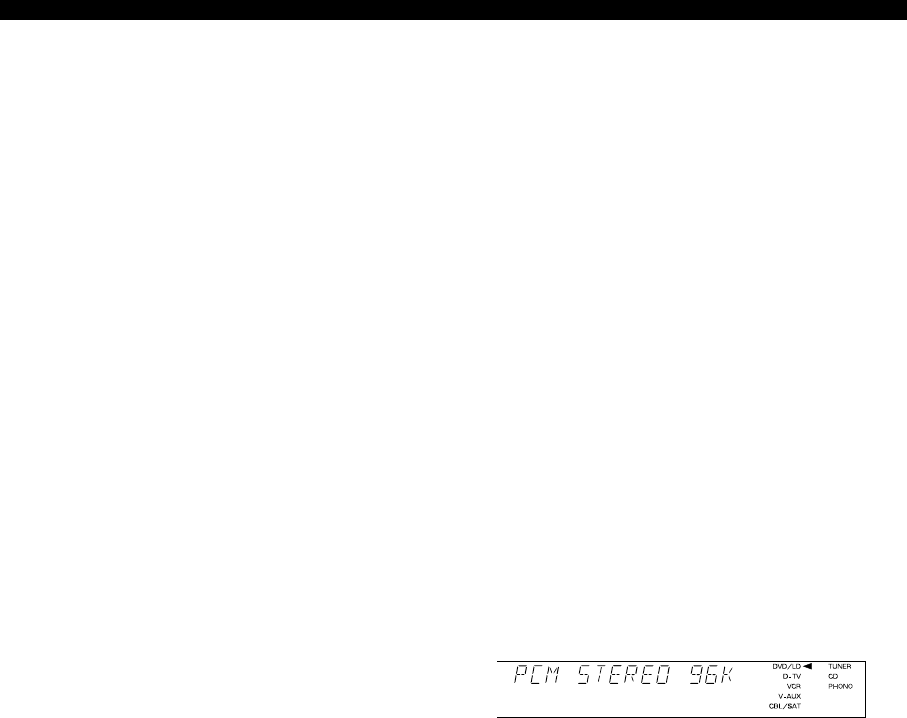
24
■ Notes on playing a source
encoded with DTS
• If “DATA ERROR” appears on the display while playing an LD
source encoded with DTS, stop playback and turn the player off
and then on again.
• If the digital output data of the player has been processed in any
way, you may not be able to perform DTS decoding even if you
make a digital connection between this unit and the player.
• If you play an LD source encoded with DTS and set the input
mode to ANALOG, there will be the noise of an unprocessed
DTS signal. When you want to play a DTS source, be sure to
connect the source to the digital input terminal and set the input
mode to AUTO or DTS.
• If you switch the input mode to ANALOG while playing a source
encoded with a DTS signal, this unit reproduces no sound.
• If you play a source encoded with DTS and set the input mode to
AUTO, there will be a short noise at first while the unit
recognizes the DTS signal and turns on the DTS decoder. This is
not a malfunction, and can be avoided by setting the input mode
to DTS beforehand. In addition, if you continue to play a source
encoded with DTS with the input mode setting left to AUTO, this
unit automatically switches to the “DTS-decoding” mode to
prevent noise from being generated during subsequent operation.
(The “t” indicator lights up on the display.) The “t”
indicator will flash immediately after playback of a source
encoded with DTS has finished. Only a source encoded with DTS
can be played back while this indicator is flashing. If you want to
play a normal PCM source soon, set the input mode back to
AUTO.
PLAYING A SOURCE
■ Notes on playing an LD source
• Some audio/video components, such as an LD player, output
different audio signals through their analog and digital terminals.
Change the input mode as necessary.
• If the input mode is set to AUTO for the LD source, this unit
automatically determines which type of signal the LD source
contains. If this unit detects a Dolby Digital or DTS signal, the
decoder automatically switches to the appropriate setting and
reproduces 5.1 channel sound.
• If the LD player is transmitting signals by a non-normal method,
this unit cannot detect the Dolby Digital or DTS signal. In this
case, the decoder automatically switches to PCM or analog.
• If the LD source does not contain a digital soundtrack, connect
the LD player to the analog terminals and set the input mode to
AUTO or ANALOG.
• While you are operating the LD player and playing a disc encoded
with Dolby Digital, if you switch from the pause or chapter
forwarding function to normal playback, you may hear the PCM
or analog sound an instant before the Dolby Digital sound is
played.
■ Notes on the digital signal
The digital input terminal of this unit can also handle
96-kHz sampling 24-bit digital signals. (To utilize this, use a
source that supports 96-kHz sampling 24-bit digital signals
and set the player for digital output. Refer to the instructions
for the player.) Note the following when a 96-kHz sampling
24-bit digital signal is input to this unit.
1. The following indicator will appear on the display.
2. DSP programs cannot be selected. Sound will be output
as normal 2-channel stereo sound using only the right
and left main speakers.
3. Delay time and speaker output level cannot be adjusted.
0104V596(UCA)21-26_EN 9/29/0, 10:04 AM24


















